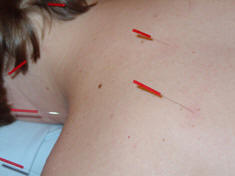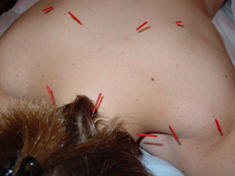|
How does acupuncture work?
The answer is: No one knows for sure. The ancient Chinese theory is that
there are meridians throughout the body where "Qi", or energy, flows. If
there is a block in the meridian, disease and pain result. By inserting an
acupuncture needle in the blocked point, the flow of Qi, and therefore health, is
restored.
Western medicine is just beginning to substantiate that
indeed,
acupuncture does have effects that cannot be explained by what we currently
know about human physiology. When performing a "functional MRI" and
needling points in the foot known to affect the eyes, the MRI shows activity in the visual
part of the cortex of the brain. Many people believe acupuncture is a biochemical
process -- needling affects the nerve synapses, and therefore the neurotransmitters that
transmit information to the brain. Acupuncture points can be found by measuring the
electrical resistance on the skin.
Even though we can't yet entirely explain exactly how
acupuncture works, 5000 years of needling points has resulted in a vast body of knowledge
regarding the effects from needling each of the over 400 acupuncture points.
The first visit includes a comprehensive medical
history
interview and a full treatment. All of your symptoms are discussed, even those you
may think are unrelated. I then develop a Chinese Medicine Diagnosis,
which determines point selection. Subsequent sessions consist of a brief discussion
about the effects of the last treatment, and a treatment for the present symptoms.
It is best to focus on a few priorities at a time.
Needles
Needles are thin, like a hair. Usually you will either feel no sensation, or
just a sensation that the needle was inserted. Occasionally, if the needle goes in a
hair follicle or blood vessel, there will be a small amount of stinging, which usually
goes away almost immediately. If the stinging does not go away, I move the needle to
a slightly different location. I use only disposable needles. I usually use
14-20 needles per treatment, and needles are typically left in between 20-35 minutes.
How Long Will Therapy Take?
A common question I get in the beginning of therapy is
"how long will it take"? My general rule of thumb is that longer the
condition has been going on and the more medical conditions (of any kind) the patient has,
the more muscles and organ systems will be involved, and the treatment will be more
complicated and take longer. If a patient is perfectly healthy and has only a recent
minor injury, I may only see them a few times. Patient compliance is a factor --
whether they follow my recommendations and participate in their healing by doing the
self-help techniques. I can usually give the patient a pretty good indication of how
many treatments they may need by the end of the second or third treatment, based on their
medical condition, their compliance to date, and how much they have improved (or not)
within the first few weeks.
Why is Acupuncture Growing So
Rapidly in the U.S.?
- It puts people back in control of their bodies and health care.
- It works on many health problems for which Western medicine is less effective.
- It is safe, effective, and has virtually no side effects.
- It treats the whole person and not just the disease.
- It uses the body's natural healing process to effect relief.
Herbs
Herbs in pill form may be prescribed to help support your treatments. The formula
will be based on your individual Chinese diagnosis, including your signs and symptoms, and
your underlying constitutional pattern. |



